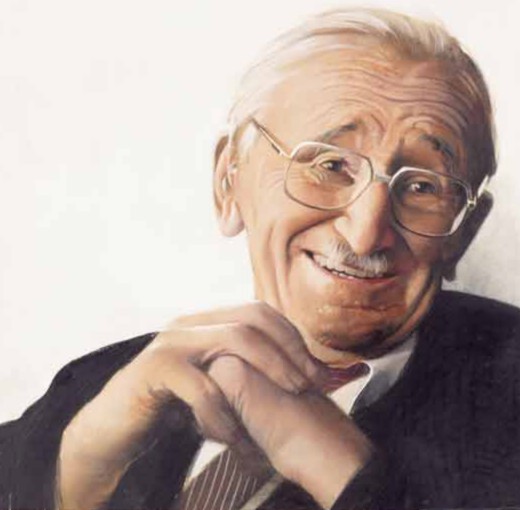Sunday, July 20, 2008
Adam Smith's Metaphor turned Myth
Posted by Simon Halliday | Sunday, July 20, 2008 | Category:
Adam Smith,
Economic History
|
 Adam Smith did not intend the 'invisible hand' as the mythic mechanism that it is now thought to be. This is the main thesis of a recent conference paper for the History of Economic Thought 40th Conference provided by Professor Gavin Kennedy, titled 'Adam Smith and the Invisible Hand: from metaphor to myth'.
Adam Smith did not intend the 'invisible hand' as the mythic mechanism that it is now thought to be. This is the main thesis of a recent conference paper for the History of Economic Thought 40th Conference provided by Professor Gavin Kennedy, titled 'Adam Smith and the Invisible Hand: from metaphor to myth'. You can see Prof Kennedy referring to the paper here on his blog Adam Smith's Lost Legacy. Kennedy discusses the fact that Smith referred to the idea of the invisible hand only three times in his writing. Once in the History of Astronomy, and once each in The Wealth of Nations (WN) and The Theory of Moral Sentiments (TMS).
I learned several things reading the essay. First of all I did not know that Smith had written anything on astronomy, let alone a comprehensive history of Roman interpretations of astronomy. Moreover, it is in this text that he refers originally to the invisible hand (written before TMS and WN, but published posthumously), in reference to the 'invisible hand of Jupiter' (Jove). Kennedy argues that this was obviously not the interpretation that Smith intended in TMS, nor in WN, but he covers it for comprehensiveness.
Kennedy goes on to discuss the role of the metaphor in TMS and in WN. He quotes the original text, where, once more, I learned something new. Firstly, whenever I have been taught Smith, I had always been given the invisible hand quote as follows, "led as if by an invisible hand" when the original quote is:

By preferring the support of domestic to that of foreign industry, he intends only his own security; and by directing that industry in such a manner as its produce may be of the greatest value, he intends only his own gain, and he is in this, as in many other cases,led by an invisible hand to promote an end which was no part of his intention. Nor is it always the worse for the society that it was no part of it. By pursuing his own interest he frequently promotes that of the society more effectually than when he really intends to promote it. I have never known much good done by those who affected to trade for the public good. It is an affectation, indeed, not very common among merchants, and very few words need be employed in dissuading them from it.
The 'as if', had always made the metaphor clear to me, it was an idea of how individuals act 'as if' influenced, or pushed by some invisible hand to do the 'will of the market'. This is wrong. There was no 'as if'. This is often added by economists as a 'softener of the stronger imperative' as Kennedy puts it.
Secondly, Kennedy argues that the metaphor was put in place to make it vivid to those people who were not economically minded, who believed the mercantilist ideals that were extant at the time. It was never Smith's intention to turn it into a myth, or for it to become the explicative mechanism adopted by Hayek,and later the neoclassical general equilibrium theorists to motivate their general equilibrium theory.
As Kennedy (2008: 30) comments,
Understanding the processes behind these cases is more important than the metaphor. The invisible hand metaphor added nothing to what Smith, the analyst, and his attentive readers, knew. It was a ‘device’ to keep the attention of his other readers.And again, (ibid. 31)
Legislators and those who influence them – his target audience – may not be given to accepting his arguments from their prejudices, from receiving the persuasion of ‘gold’ and social preferment, and from the complexities of competing views on political economy.

Adam Smith's ideas of individual risk-aversion, of self-interest would lead the free market to better outcomes for society and for individual
consumers. The problem though was that these same merchants who would be 'led by an invisible hand' to do the best for such consumers would also be led by their self-interest to try to procure protection,
subsidies, government support and so forth (on this, see Kennedy's
post: Adam Smith not a Laissez-Faire ideologue). Thus it was in the interest of the people, Smith argued, that government and legislators should not give in to these individuals, should retain the freedom of the market for the benefit of the citizens.
Kennedy quotes from WN:
The interest of the dealers, however, in any particular branch of trade or manufactures, is always in some respects different from, and even opposite to, that of the publick. To widen the market and to narrow the competition, is always the interest of the dealers.Kennedy's initial discussion commenced with references to the reverence that modern day economists have for the invisible hand metaphor. They, Kennedy quotes Arrow, Hahn & Tobin, have given it mythic proportions that were entirely unintended by its author, and quite possibly would have been ridiculed by Smith for such reverence.
Anyway,that is enough for now. I'd like to leave this post with the image of Smith chuckling at general equilibrium theorists, my respect for Arrow aside. I did not cover the interpretation of the invisible hand in TMS. Have a read of the essay and Kennedy's blog if you are interested.

[Post script: I think that Hayek has the idea of the 'invisible hand' better (than the GE theorists) in respect of his ideas on how the market acts as a communication device for prices and translates information to and from individuals: the 'emergent property' and the 'spontaneous organisation' for which he is much acclaimed. Kennedy comments (ibid. 24) on this arguing
coherently that the label 'spontaneous' is a bit of a misnomer, it
should rather be called something like 'slowly cohering organisation'
or 'organisation adjusting as people realise their errors'.]
Research note: the resources I linked to for the Moral Sentiments and Wealth of Nations are particularly useful because you can use a search engine to search for items in the text. Thus, if you're at all sceptical (which you need not be) you can check the number of appearances of 'invisible hand' and confirm the fact that Kennedy is correct on its appearances
in TMS and WN.
Subscribe to:
Post Comments (Atom)




Currently have 0 comments:
Post a Comment